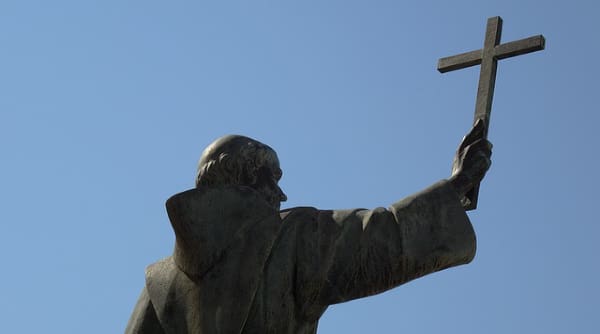Editor’s note: This is part 36 of a series, “The Kingdom of Grace.” Part 35 can be found here.
All human beings carry a certain pathos of the heart from the fall of Adam, so all of us experience a certain interior flow of dark thoughts, disordered passions, and distractions in our minds. The pathos of the fallen heart becomes most apparent when we sit down to pray. Silence is challenging and tends to heighten our awareness of our inner turmoil. Vigilance consists of guarding the heart from the turmoil in order to remain on the lookout for God, but persistent vigilance is itself difficult. Is there anything to help us with inner silence and the practice of vigilance?
The principal help, of course, is the grace of God. Our first recourse is always petitionary prayer for the grace to be silent within and steadfast in vigilance. We know “the Spirit helps us in our weakness” (Rom. 8:26). We also know that without grace from God, all our human efforts are in vain. For the Lord told us: “Apart from me you can do nothing” (Jn. 15:5). Yet, we are surrounded by a great cloud of witnesses, and recourse to the Virgin, Saint Joseph, and all the Saints goes no small way in obtaining for us the grace to pray, to be interiorly silent, and to remain on the lookout for the Lord Jesus Christ.
The desert fathers of Egypt tell of another help. Abba Moses tells of a certain “gospel plow” we can use to turn up the ground of our hearts. “At every moment we should cultivate the earth of our heart with the gospel plow – that is, with the continual remembering of the Lord’s cross – and we shall be able to root out from ourselves the nests of harmful animals and the hiding places of venomous serpents” (Cassian, Conferences, I.22). The harmful animals and the venomous serpents are the dark thoughts, disordered passions, and distractions lurking in our hearts. If there is any remedy for them, if there is any special help for remaining silent and watchful in prayer, it is to be found in the cross of our Lord Jesus Christ.
Recollection of the Lord’s cross means meditation on his love. The sufferings of Christ crucified are worth pondering at length, but only because the magnitude of his suffering reveals the magnitude of his love. For he bore every one of his sufferings voluntarily, out of love for you and me, in order to save us from our sins and breathe new life into our souls. When you and I go into silence, when we seek to pray, when we seek to guard our hearts in order to remain on the lookout for the Lord Jesus, the single greatest help at our disposal is simply his love for us. Christ died for us. “No one could know how much Christ has loved us,” said Saint Thomas Aquinas. Though we could never fully fathom his love, still, we can look to his love in faith. When we do, the eyes of our hearts stand a good chance of rising above the inner turmoil within us and remaining fixed on Jesus. For the love of Jesus Christ is more captivating than all the goods of this world combined.
When the Spirit helps us in our weakness to remember the loving cross of our Lord Jesus Christ, the Spirit also inclines our hearts to call upon the Name. In a previous article on The Name in Our Hearts, we spoke of how the name of Jesus is no ordinary name. The Name is a sign full of his presence, his power, his influence. The Name is an interior sacramental. It is a wonder of his grace, and we bear the Name in our hearts wherever we go. Let us use this grace given unto us. Let us call upon the Name. When with faith we call upon his Name, the Lord Jesus Christ himself transmits new graces from his soul to ours.
The Name is an interior sacramental.
In fact, everything the Lord Jesus does in the gospels he will also do in our lives, in a certain way, through his Name dwelling in our hearts. In the gospels, Jesus made the blind to see, the deaf to hear, and the lame to walk. Similarly, when we call upon the Name, he opens the eyes of our hearts to know him, he prepares our hearts to listen to him in faith, and he points out the path of virtue and righteousness in our personal circumstances. In the gospels, Jesus cast out demons, and in our hearts the Name neutralizes temptations. In the gospels, Jesus cleanses people of shameful leprosy, and in our hearts the Name cleanses us of shameful thoughts. In the gospels, Jesus taught the crowds many truths, and in our hearts the Name is a fountain of lights and insights into all the mysteries of God. “Everyone who calls on the Name of the Lord will be saved,” Saint Paul says (Rom. 10:13). For Jesus Christ transmits “grace upon grace” to those who call upon his Name (Jn. 1:16). Indeed, we who believe in the Name receive the power to become children of God (see Jn. 1:12). Calling upon the Name protects and promotes The Grace of Filial Adoption.
It does the same for the life of prayer. When we enter into outer silence, the inner noise grows louder. Our prayer will be submerged in the inner noise unless our mind finds something better to occupy it. Let the Name occupy our minds in prayer. Lord Jesus, Lord Jesus, Lord Jesus. The practice is very ancient. Saint Diadochos of Photike, writing during the mid-fifth century to beginners in prayer, says this: “the intellect requires imperatively some task which will satisfy its need for activity. Let us give it nothing but the prayer ‘Lord Jesus’” (One Hundred Chapters, 59). To call upon the Name of the Lord Jesus is perhaps the simplest practice of all on the pathways of metanoia.
When we learn to call upon the Name repeatedly, with faith and love, it becomes like an anchor of the soul in a sea of distractions. One good way to begin periods of silent prayer and meditation is by simply calling upon the Name for a few moments. We can then proceed with whatever form of lectio divina or meditation we have purposed, but soon enough waves of distraction are sure to come – clamoring for our attention and acceptance. When we notice them, we should simply disregard them and return to the Name. Lord Jesus, Lord Jesus, Lord Jesus. If we become distracted again, we disregard them again and return to the anchor. Lord Jesus, Lord Jesus, Lord Jesus. Eventually, when we depart from the time of prayer to our daily work, the habit of calling upon the Name remains. Gradually, we learn to call upon the Name even throughout the day – even in the middle of work. Lord Jesus, Lord Jesus, Lord Jesus. Indeed, Saint John Climacus says: “let the remembrance of Jesus be present with your every breath” (Ladder, Step 27).
When we learn to call upon the Name, it becomes like an anchor of the soul in a sea of distractions.
From the days of the blind beggar Bartimaeus to the masters of prayer today, the wisdom of calling upon the Name has developed gradually over the course of the centuries. One of the most venerable traditions is the Jesus Prayer. It is a short prayer: Lord Jesus Christ, Son of the Living God, have mercy on me, a sinner. Yet, one of the earliest recorded versions of it is even shorter. It comes from the seventh-century Egyptian hermit Abba Philemon. “Keep watch in your heart,” he said, “and with watchfulness say in your mind with awe and trembling: Lord Jesus Christ, have mercy upon me.” To call upon the Lord Jesus Christ for mercy is to call upon him for medicine, for healing balm, and for love. In the end, whether one meditates on the Cross or calls upon the Name or both, it all comes to the same thing – a mind full of Christ.
____________________________________________________________________
Father James Dominic Brent, O.P. is a Dominican Friar who lives and teaches at the Dominican House of Studies in Washington, DC. He is the author of The Father’s House: Discovering Our Home in the Trinity. His podcast is called Contemplata — a podcast for contemplative souls. He posts select homilies, spiritual conferences, interviews, and radio spots on on his personal Soundcloud site. He frequently lectures for the Thomistic Institute and appears on Aquinas 101.
Image: Pixabay




